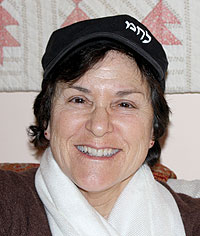

Somerville poet Jesse Mavro Diamond.
Somerville poet Jesse Mavro Diamond wrote the LYRICAL: “I wrote this elegy in 2005 after the train I was riding from Boston to Washington D.C.struck and killed Devron Pittman, an eleven year old boy.”
Jesse Mavro Diamond’s poetry has been published in many journals throughout the U.S.She recently was chosen by The Tennessee Williams Literary Festival as one of the top ten finalists for her poem “Swimming The Hellespont.” The composer Mu Xuan Lin’s vocal and instrumental compositions for “Elegy for Devron” premiered at Jordan Hall in 2008.
ELEGY FOR DEVRON
“That’s what eats you… the sound …It never goes away.
You’ll always be able to hear that sound.”
–Anonymous Railroad Engineer
In Memoriam: Devron Pittman. 08 February 1994-19 February 2005
I. The Mask:
Invocation to Melpomene
Rise, Muse, from your caskets’ indigo sleep
Shadow me up Echo’s blue-walled tower.
A boy’s home was never further from his feet
than skipping through Dusk’s muted, trumpeted hour.
Sing, Bessie, reckless Empress, gravel’s brave, red flower,
Sing, Billie, Sorrow’s Boo, Old Man Winter’s heat,
Sing, Ella, your silver scat cat over puddles leaps:
A mother’s cup of cream has been forever soured.
Pull the black threads through the needle of your throats
Stitch the child’s reft breast, measure by measure,
Lift his gone breath in your skirts’ sheer boat:
Rise, Muses, Up! cradling your sunken treasure.
II. The Club:
Express Train 2253
We sat in the car’s half light,
(what’s known and what is not.)
Without pretense, simple strangers.
We sat as Dusk spread its dark sheet
over the small body of day.
Across the aisle a man said it: Suicide.
Then his coda, I’m certain.
That’s what we need. That’s the ticket: Certainty.
Down the tracks we chase the straw hat,
Its radiant ribbon skittish in the February wind.
He was right about one thing. Wrong about another.
The boy never chose to die.
He chose to find his friend at the dollar store,
to take a shortcut through the woods,
to cross the tracks behind Battery Village.
Whoosh!
the train wheels sang,
like Hermes’ winged heels.
Of this
we can be certain.
III. The Sword:
Short Cut Home
The instant he was gone, so was I.
I am she: Lot’s wife, Ildeth,
body facing forward, head back,
back to the hissing track,
searching for a shoelace,
a fragment of cuff,
searching the embankment his sneakers slid down.
Searching for the echo of his whistle in the woods.
Searching the kitchen board:
Devron, congratulations on honor roll.
Searching the last spring
cherries blossomed in Havre de Grace,
the last September my boy began school.
I face the erased. My body goes forward:
on and on, on and on, on and on
Cothurnes:
The Walk Back
Since you’re a writer, I’ll tell you.
The engineer’s sitting in the same seat
he was half a second before.
Waiting.
To be relieved.
The others are walking the track. Back.
Several miles. Sun’s sinking. And cold.
They never made a boot
could warm you from that walk.
Government calls it ‘Trespasser Fatality.’
We call it Hell. ‘Cause that’s what the hoghead—
engineer—is damned to. Would you?
Ever drive again?
Most guys are fathers, too.
Could a been his boy. Do me a favor:
Find a way to say that.
The Crown:
Conservation of Energy
Dear Boy, I am with you now
While you lay curled beneath
a cypress tree.
Lyrical time is the amniotic clock
the measurable delay between
a sound wave and an echo.
Within that interval, actual
as a fertilized egg:
spiritual suspension.
These lines are the tracks.
This keyboard, the high-speed engine.
I am the passenger, a stranger.
I am breathing before, during, after.
Each syllable I sing is a cypress leaf
I have entwined them here
into a crown.
I know you are gone.
I know this is merely a poem.
Words can be destroyed.
Words can be unknown.
But you, Dear Boy,
are eternal.
May my breath be yours.
___________________________________________
To have your work considered for the LYRICAL send it to:
dougholder@post.harvard.edu












Reader Comments